m3u1-2情态
八年级上册英语m3u1知识点

八年级上册英语m3u1知识点在八年级上册英语中,Module 3 Unit 1是关于“Travel by train”的内容,下面是该单元的核心知识点。
1. 表达乘火车旅行的词汇及短语:train station - 火车站platform - 站台ticket office - 售票处ticket - 票one-way ticket - 单程票return ticket - 往返票timetable - 时间表departure time - 出发时间arrival time - 到达时间seat - 座位2. 用英语表述火车票的购买:How much is a one-way ticket to London? - 一张去伦敦的单程票多少钱?Can I have a return ticket to Paris, please? - 我想要一张巴黎来回的票。
What time is the first/last train to Manchester? - 去曼彻斯特的第一班/最后一班火车什么时候?Can I reserve a seat? - 我能预订座位吗?3. 用英语表述火车的时刻表:What time does the train leave/arrive? - 火车几点出发/到达?What platform does the train leave from? - 火车从哪个站台出发?4. 表达路线和方向的词汇及短语:north - 北south - 南east - 东west - 西The train is going north/south/east/west. - 火车往北/南/东/西开。
5. 表述旅行活动的词汇及短语:sightseeing - 观光tourist attraction - 景点guide - 导游map - 地图camera - 相机souvenir - 纪念品6. 熟练运用简单的交通指令:Excuse me, how do I get to the train station? - 对不起,请问怎么去火车站?Take the bus number 10 and get off at the train station. - 乘坐10路公交车,在火车站下车。
外研版初中英语八上册Module3 Unit1中考知识点整理与练习

2021届外研版初中英语八上M3U1中考知识点整理与练习1.辨析:b o r i n g与b o r e da①b o r i n g烦人的,无聊的,指某人或某事物让人感到无聊常作定语或表语②b o r e d感觉厌烦的,厌倦的,常用来说明人的感受,人感到无聊,常作表语一言辨异:I a m b o r e d w i t h t h e b o r i n g f i l m.我对那部无聊的电影感到厌倦。
[拓展]以-i n g结尾的形容词多修饰或说明事物,有时也可以描述人,说明事物或人本身的特性;以-e d结尾的形容词多用来说明人的感受。
常见的这类单词有:i n t e r e s t i n g有趣的-i n t e r e s t e d感兴趣的e x c i t i n g使人兴奋的-e x c i t e d兴奋的r e l a x i n g使人放松的-r e l a x e d放松的2.(n o t)a t a l l①一点儿也(不),根本(不)n o t一般与连系动词b e、助动词或情态动词连用,而a t a l l位于句末。
S h e d o e s n't l i k e i t a t a l l.她根本不喜欢它。
②别客气,常用于回答对方的感谢。
-T h a n k y o u v e r y m u c h.非常感谢。
-N o t a t a l l.别客气。
3.W h a t's t h e m a t t e r?怎么了?用来询问某人或某物出了什么状况或问题,后面可接w i t h短语。
W h a t's t h e m a t t e r w i t h y o u r e y e s?你的眼睛怎么了?W h a t's t h e m a t t e r w i t h M r s B r o w n?布朗夫人怎么了?[拓展]询问“(某人/某物)怎么了?”的句型还有:W h a t's u p(w i t h. . .)?W h a t's w r o n g(w i t h. . .)?W h a t's t h e t r o u b l e(w i t h. . .)?W h a t h a p p e n s(t o. . .)?4.t h a t's b e c a u s e...那是因为……b e c a u s e后的句子用以说明原因。
教学设计新部编版九上M3U1
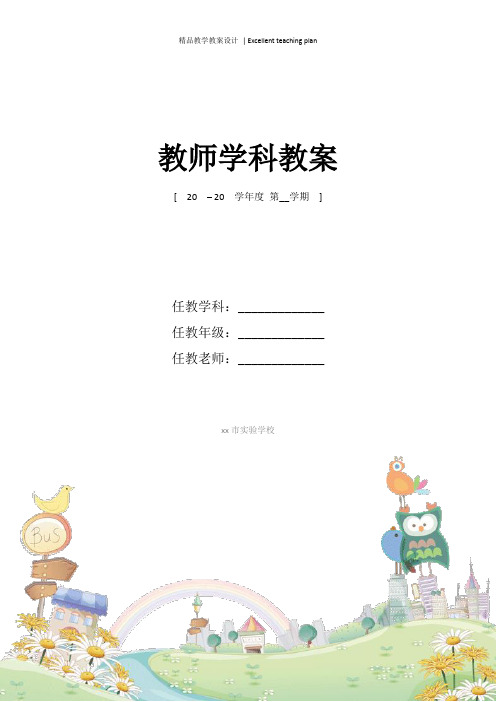
教师学科教案[ 20 – 20 学年度第__学期]任教学科:_____________任教年级:_____________任教老师:_____________xx市实验学校教学设计“一师一课”教学反思在本次活动中,我上课的课题为九年级上册M3 U1。
课后进行本节课的教学反思,此次授课活动有成功也有遗憾,现反思如下:一.设计初衷通过学生对话,学生可以了解到邓亚萍刻苦努力、锲而不舍的精神品质。
与此同时,了解如何介绍自己的偶像个其它人。
二.预期效果首先向学生介绍自己心目中的英雄形象,很有抛砖引玉之功效,然后在对话中通过听和读获取大明心目中的英雄形象的信息,最后再由学生学以致用,讨论自己心目中的英雄形象,就这样循序渐进,层层突破。
教学中实际达成情况在体验这一阶段,教师用一套配有音乐的自动播放的幻灯片展示自己英雄形象,学生体验到介绍英雄形象时可以着眼于姓名,职业,事迹,自己对他的评价这四个方面,同时,学生了解到可以用When After来按时间顺序描述英雄事迹的表达方法,另外,学生在表达原因和结果时能够恰当的使用“because”和“so”,在语言输入的过程中,教师利用学生们了解的“母亲”的角色为载体,以介绍母亲的艰苦生活为切入点,把要学的知识融入其中,学习的过程是一个自然地以旧带新,一点带面的过程。
在“发现”这一阶段,教师引导学生先听大意,在读细节,再次发现介绍英雄形象的表达方法与词汇运用。
教师再次引领学生通过姓名,职业,事迹和评价这四个方面把握大明的英雄形象。
最后一个“建构”阶段,如果说前两个阶段是在为学生输入大量的语言信息,这一环节的语言输出显得那么的顺理成章,水到渠成。
要求学生进行一个半开放话题的讨论,既照顾全体学生,又不限制优秀生,学生在对子谈论各自的英雄形象,既表达了自己,又互换了信息,达到用英语交流的目的。
三.归因分析本堂课中,从准备上来说还是比较充分的,利用图片展示,猜科目猜句子等环节调动了学生的积极性,使他们更有兴趣进行之后的环节。
上海牛津版英语5BM3U1讲义(教师版)
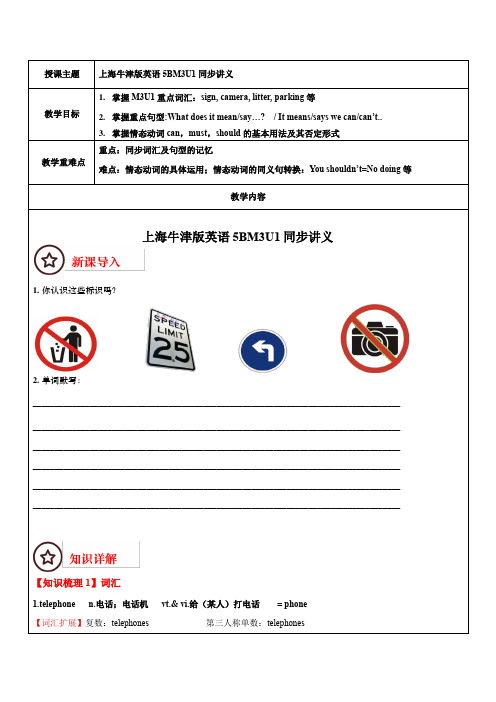
授课主题上海牛津版英语5BM3U1同步讲义教学目标1.掌握M3U1重点词汇:sign, camera, litter, parking等2.掌握重点句型:What does it mean/say…? / It means/says we can/can’t..3.掌握情态动词can,must,should的基本用法及其否定形式教学重难点重点:同步词汇及句型的记忆难点:情态动词的具体运用;情态动词的同义句转换:You shouldn’t=No doing等教学内容1.你认识这些标识吗?2.单词默写:____________________________________________________________________________________ ____________________________________________________________________________________ ____________________________________________________________________________________ ____________________________________________________________________________________ ____________________________________________________________________________________ ____________________________________________________________________________________【知识梳理1】词汇1.telephone n.电话;电话机vt.& vi.给(某人)打电话= phone【词汇扩展】复数:telephones 第三人称单数:telephones上海牛津版英语5BM3U1同步讲义•1.基本结构:主语+ will+动词原形+其他例: He will play(play) football tomorrow.2.常见的时间标志:(1) tomorrow, tomorrow+时间: tomorrow morning/afternoon/evening...(2) next+时间: next week(下周)...(3) in+一段时间: in 2050, in five days(4)…later: five days later 五天后(5) this…: this afternoon/evening/Sunday/week/month/year...▲其他一些时间标志: in the future(在将来), one day(一天), someday(未来某一天), soon(不久)3.一般将来时改写句子1)一般疑问句:提前情态动词will至句首,句号变问号,即will+主语+动词原形+其他…?例: He will visit his grandma next Sunday. →Will he visit his grandma next Sunday?2)否定句:在will后面+not,即“主语+will+not+动词原形+其他”, will not可缩写成won't例: He will visit his grandma next Sunday. →He won't visit his grandma next Sunday.3)特殊疑问句:结构:特殊疑问句= 特殊疑问词+一般疑问句I.选出在意义上属于不同类单词的选项:( )1.A. drop B. pick C. walk D. entrance( )2.A. should B. can C. do D. must( )3.A. hospital B. exit C. toilet D. restaurant( )4.A. computer B. television C. telephone D. bedroom( )5.A. noisy B. sign C. dirty D. cleanKeys:DCBDBII. 按要求写单词:1. flowers(单数)___________2. picnic(复数)__________Keys: 1. A 2. C 3. B 4. C 5. BII.阅读短文选择最恰当的答案:Monday mornings are usually terrible(糟糕的). Father gets up late. He is always in a hurry. He doesn’t do morning exercises. He doesn’t go for a running. He doesn’t have breakfast. He runs to the bus stop, but he often misses the bus. He is always late for work on Monday. Sometimes his boss shouts at him. Sometimes his boss is late too. Haha… What terrible Mondays!( ) 1. On Monday morning father is always ________.A. earlyB. busyC. in a hurry( ) 2. Father doesn’t have breakfast on Monday morning because ________.A. he doesn’t do morning exercisesB. he runs to workC. he’s afraid to be late for work( ) 3. Father goes to work ________.A. on footB. by busC. take a bus( ) 4. ________ is/are sometimes late for work on Monday.A. FatherB. His bossC. Father and his boss( ) 5. Father _______ late on Monday mornings.A.gets upB. goes to bedC. goes joggingKeys: 1. C 2. C 3. B 4. B 5. A1.重点词汇:sign telephone walk smoking swimming restaurant toilet2.重要句型:You can’t ride here. =____________________________ =____________________________3. 掌握并了解一般将来时:________________________________________________III. Fill in the blanks with the given words in their proper forms (用所给单词的适当形式填空)。
语法类型

高中英语语法M1U1 直接引语和间接引语(陈述句和疑问句)M1U2直接引语和间接引语(请求与命令)M1U3 现在进行时表将来M1U4 定语从句(以that,which,who和whose引导)M1U5 定语从句(以where,when,why,介词+which,介词+whom引导)M2U1 定语从句(限制性,非限制性)M2U2 一般将来时的被动语态M2U3 现在完成时的被动语态M2U4 现在进行时的被动语态M2U5 定语从句(以介词+which/whom引导)M3U1 情态动词(can,could,may,might,will,would,shall,should,must,can’t)用法M3U2 情态动词ought to用法M3U3 宾语从句,表语从句M3U4 主语从句M3U5 同位语从句M4U1 主谓语一致M4U2 动词-ing形式作主语和宾语M4U3 动词-ing形式作表语,定语和宾语补足语M4U4 动词-ing形式作定语和状语M4U5 构词法(合成法,派生法,转化)M5U1 过去分词作定语和表语M5U2 过去分词作宾语补足语M5U3过去分词作状语和定语M5U4 倒装M5U5 省略M6U1 虚拟语气M6U2 虚拟语气M6U3 it的用法M6U4 it的用法M6U5 –ing形式M7U1 不定式M7U2 被动语态和动词不定式的被动形式M7U3 被动语态,动词-ing形式的被动式M7U4 限制性定语从句M7U5 非限制性定语从句M8U1 名词性从句用作主语,宾语和表语M8U2 同位语从句M8U3 过去分词用作定语,表语和宾语补足语M8U4 过去分词用作状语M8U5 动词时态,现在完成进行时态。
八年级M3U1课文知识点

八年级M3U1课文知识点本文将会为大家详细解析八年级M3U1课文的知识点。
一、词汇1. fragment (n.) - 碎片2. shatter (v.) - 粉碎3. exterior (adj.) - 外部的4. interior (adj.) - 内部的5. reassemble (v.) - 重新组合6. vibrant (adj.) - 充满活力的7. renowned (adj.) - 有名的8. magnify (v.) - 放大9. symmetry (n.) - 对称10. envision (v.) - 想象二、课文概述本课文主要讲述了一位名叫 Christian 的艺术家,他通过收集被遗弃的材料创作了一系列艺术品。
在他的作品中,可以看到对称美的追求、物品的重用以及充满活力的颜色。
三、文中细节1. Christian 使用的材料包括废弃的飞机零件、旧照片和废铁。
2. 他的作品包括了不少对称美元素,比如翅膀和人脸。
3. Christian 擅长将物品重新组合并塑造成新的形状。
4. 他的颜料选用从城市建筑中收集的颜色,使得作品充满活力。
5. Christian 创作的作品引起了人们的关注,并使他成为了国际上著名的艺术家之一。
四、语言点分析1. 表示粉碎的动词 shatter, break up, fragment 等可以互相替换使用。
2. 代表内部和外部的词语 interior 和 exterior,可以帮助我们描述事物的内外构造。
3. Magnify 表示放大,相对应的词汇有 shrink (缩小) ,zoom in (缩放) 等。
4. 我们可以使用英语中特有的名词 + 动词的语法结构,比如Symmetry 意为对称,可以通过建立符合对称美的形状来描述一个对称的物品。
5. Envision 表示“想象”,表示与之相似的词汇有 imagine, envision, picture,visualize 等。
八年级上册英语m3u2知识点

八年级上册英语m3u2知识点本文将为大家介绍八年级上册英语M3U2的知识点,涵盖重点单词及短语、语法和阅读理解等方面。
一、重点单词与短语1. neighborhood (n.):邻居、社区2. teammate (n.):队友3. gossip(n.):闲话、谣言4. challenge(n.):挑战5. accept(v.):接受6. reject(v.):拒绝7. honest(adj.):诚实的8. confident(adj.):自信的9. respond(v.):回应10. to be excited about(phr.):对...感到兴奋二、语法1. 情态动词:can/can’t, will/won’t, shall/should, would/wouldn’t, may/might, must/mustn’t等用于表示情态的动词。
2. 一般现在时:表示经常性、习惯性或当前的情况、真理等。
例如:I often go to the park on weekends.三、阅读理解阅读理解部分主要包括填空、选择、判断等题型,考查学生的阅读理解能力。
以下是一篇范文:My NeighborhoodI’m a middle school student. I live in a peaceful and friendly neighborhood, where I have a lot of good memories.My neighbors are very kind and helpful. Whenever we have a problem, they are always willing to lend us a helping hand. We always share food and drinks with each other, and we often have BBQs together on weekends.Recently, our community has organized a “green day” activity, which aims to plant more trees and flowers in the neighborhood. All the residents participated in this activity actively, and we made our community greener and more beautiful.Living in such a nice neighborhood is really a wonderful experience, which teaches me the importance of helping others and caring for the environment.1. What is the writer’s impression of his/her neighborhood?A. Beautiful and peacefulB. Crowded and noisyC. Dirty and boring2. What do the writer’s neighbors do when someone has a problem?A. Lend them a helping hand.B. Ignore them.C. Laugh at them.3. What did the community recently organize?A. A BBQ party.B. A planting activity.C. A sports event.以上就是本文为大家介绍的八年级上册英语M3U2的知识点,希望对大家有所帮助。
外研版九年级上册m3u2知识点

外研版九年级上册m3u2知识点在九年级英语上册中,第三单元的学习内容主要涉及到各种知识点。
本文将以这些知识点为主线,结合一些实际例子进行深入探讨,以帮助同学们更好地理解和掌握这些内容。
首先,我们来看看本单元的第一个知识点:过去完成时。
在九年级的学习中,我们已经掌握了一些过去时态的基本用法,而过去完成时则是在过去的某个时间点之前发生的动作或事件。
比如,我们可以说:“When I arrived at the cinema, the film had already started.”在这个句子中,arrived是过去完成时,表示在到达电影院之前,电影已经开始了。
通过这个例子,我们可以清楚地理解过去完成时态的用法,并成功运用到实际情境中。
接下来,我们来看看本单元的第二个知识点:情态动词can, could和be able to的用法。
在我们的日常生活中,我们经常使用情态动词来表达能力、许可、可能性等等。
can和could都表示能力或可能性,例句如下:“I can swim”、“I could swim when I was younger”。
而be able to的用法和can类似,但更加正式和口语化。
例如,“I am able to speak three languages”、“I was able to finish my homework on time”。
通过学习这些例句,我们可以更清楚地理解不同情境下的用法,并且在实际交流中能够准确运用这些知识。
第三个知识点是虚拟语气中的与过去事实相反的条件句。
在英语中,我们经常使用虚拟语气来表达与事实相反的假设。
在这个单元中,我们学习了与过去事实相反的条件句,用来表达对过去的一种遗憾、惋惜或后悔。
比如,我们可以说:“If I had studied harder, I would have passed the exam.” 在这个句子中,如果我当初更加用功学习,我就会通过考试。
八上M3U1教学设计

(1)What’s the matter with....?
(2)Nothing is more enjoyable than playing tennis.
(3)Staying at home is easier than going to the stadium.
3.语法或功能项目:comparative adjectives and adverbs(more....)
外研版八年级上册Module3Unit 1教学设计
一、基本信息
教材与主题
外研版八上Module3Sports
Unit 1Nothing is more enjoyable than playing tennis.
课型
听说课
教法与学法
3Pmodel and task-based learning
学段
八年级上册
To help students get the main idea of the dialogue andcultivate their thinking ability by inferring where the dialogue happen.
To improve students’ ability of listening for details and check their comprehension of the conversation by asking the questions.
Which one do you like, watching TV or playing tennis? Why?
Life lies in movement.
Sport is the source of health.
上海版牛津 2A M3U1知识点
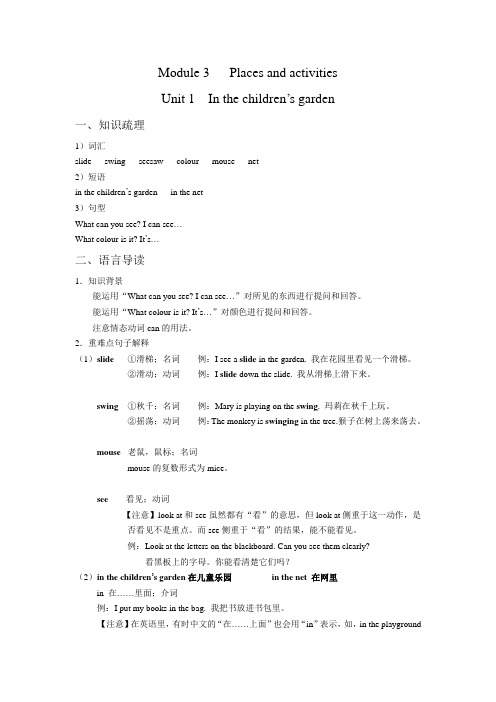
Module 3 Places and activitiesUnit 1 In the children’s garden一、知识疏理1)词汇slide swing seesaw colour mouse net2)短语in the children’s garden in the net3)句型What can you see? I can see…What colour is it? It’s…二、语言导读1.知识背景能运用“What can you see? I can see…”对所见的东西进行提问和回答。
能运用“What colour is it? It’s…”对颜色进行提问和回答。
注意情态动词can的用法。
2.重难点句子解释(1)slide ①滑梯;名词例:I see a slide in the garden. 我在花园里看见一个滑梯。
②滑动;动词例:I slide down the slide. 我从滑梯上滑下来。
swing ①秋千;名词例:Mary is playing on the swing. 玛莉在秋千上玩。
②摇荡;动词例:The monkey is swinging in the tree.猴子在树上荡来荡去。
mouse 老鼠,鼠标;名词mouse的复数形式为mice。
see 看见;动词【注意】look at和see虽然都有“看”的意思,但look at侧重于这一动作,是否看见不是重点。
而see侧重于“看”的结果,能不能看见。
例:Look at the letters on the blackboard. Can you see them clearly?看黑板上的字母。
你能看清楚它们吗?(2)in the children’s garden在儿童乐园in the net 在网里in 在……里面;介词例:I put my books in the bag. 我把书放进书包里。
外研版三起四下M3大单元整体备课
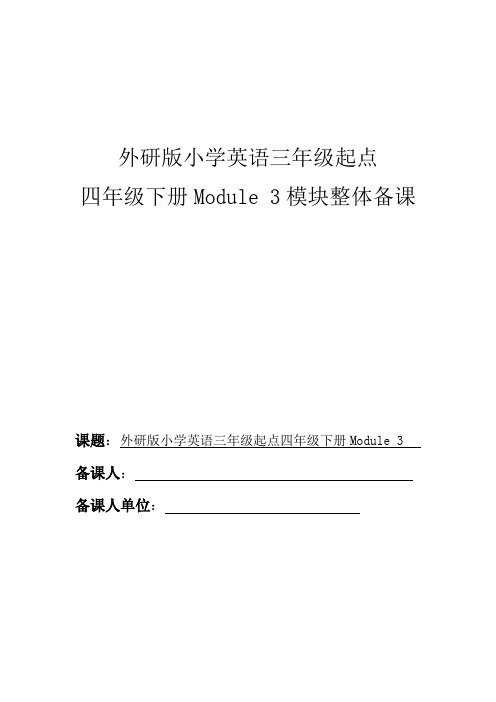
外研版小学英语三年级起点四年级下册Module 3模块整体备课课题:外研版小学英语三年级起点四年级下册Module 3 备课人:备课人单位:一、课标要求二、单元主题本单元的主题是life in the future ,该主题属于“人与社会”和“人与自我”的范畴,涉及“科学技术改变生活”以及“学习与生活的自我管理”。
本单元内容围绕Plan这一主题展开,涉及两个语篇,包括一组日常对话和一个配图人物故事。
共分为两个课时:第一课时是Robot in the future ;第二课时是My Plans。
三、模块教材分析本模块主要学习和谈论了将来会发生的事情。
新学习了一般将来时will do的陈述句句型结构,与四上学习的be going to do结构进行区分。
学生通过对将来的学习和生活的描述,巩固一般将来时的句型结构,并进一步能够运用一般将来时,结合真实的语言情景进行话题描述。
四、模块教学目标五、课时教学设计1.出示机器人图片,学生能完成填空They are talking about ______.(针对目标一)2.学生能够用It can __________.去介绍自己理想当中的机器人是什么样子。
(针对目标二、四)3.看完视频学生能够做出选择(针对目标一)4.让学生用can的句型去介绍图片当中robots will do everything.这正是大明的想法。
4.出示第三个视频,提问:What will robots do in the future?5.绘制时间轴,区分:can do和will do,并描述表格内容。
Step 3. Practise1.Listen and imitate.2.Read the text by yourself.3.Retell the text.Step 4. Extension1.完成习题单,填空。
2.情感升华:科技改变生活,但科技不能代替人类,我们还是要努力学习,创造属于自己的美好生活。
八年级上册英语m3u1课文
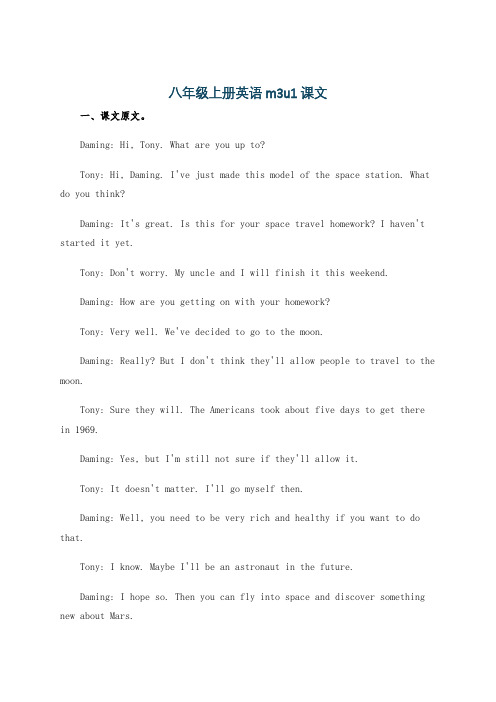
八年级上册英语m3u1课文一、课文原文。
Daming: Hi, Tony. What are you up to?Tony: Hi, Daming. I've just made this model of the space station. What do you think?Daming: It's great. Is this for your space travel homework? I haven't started it yet.Tony: Don't worry. My uncle and I will finish it this weekend.Daming: How are you getting on with your homework?Tony: Very well. We've decided to go to the moon.Daming: Really? But I don't think they'll allow people to travel to the moon.Tony: Sure they will. The Americans took about five days to get there in 1969.Daming: Yes, but I'm still not sure if they'll allow it.Tony: It doesn't matter. I'll go myself then.Daming: Well, you need to be very rich and healthy if you want to do that.Tony: I know. Maybe I'll be an astronaut in the future.Daming: I hope so. Then you can fly into space and discover something new about Mars.Tony: Mars? I'd like to go there too. Has anyone been to Mars yet?Daming: No, but scientists are working hard in order to send astronauts to Mars one day.Tony: That's interesting! How can I get information on space travel?Daming: You can go online to search for the information.Tony: Good idea. I'll do it right away.Daming: Have you heard the latest news? Scientists have sent a spaceship to Mars.Tony: Really? Has it arrived yet?Daming: No, it has taken several months to get there.Tony: And have the astronauts discovered life on Mars?Daming: No, not yet. There isn't any life on Mars.Tony: Why not?Daming: Because there's no water there. And it's very cold. Almost nothing can grow there.Tony: Oh, I see. So it's difficult for astronauts to live there.Daming: Yes, it is. But maybe in the future they could build some special houses.二、重点单词与短语。
八年级上册英语M3u2的知识点

八年级上册英语M3u2的知识点本篇文章将介绍八年级上册英语M3u2的知识点,包括词汇、语法、听力、口语等方面的内容,希望对学习英语的同学们有所帮助。
一、词汇1. introduce:介绍例句:May I introduce myself? 我可以介绍一下自己吗?2. from:来自例句:I am from China. 我来自中国。
3. introduce…to:把……介绍给……例句:Let me introduce my friend to you. 让我把我的朋友介绍给你们认识。
4. happy:高兴的例句:I am very happy to meet you. 很高兴见到你。
5. excited:激动的例句:I am so excited to go to America. 去美国我感到非常激动。
6. sad:悲伤的例句:She looked sad when she heard the news. 听到这个消息,她显得很伤心。
二、语法1. 一般过去时在介绍过去的事件时使用,通常动词末尾加了-ed。
例如:walked、played、studied等。
例句:Yesterday, I walked to school. 昨天,我走路去了学校。
2. 直接引语和间接引语直接引语是将别人的话原封不动地说出来,使用引号标注;间接引语是自己用自己的话转述别人的话,不使用引号标注。
例句:直接引语"He is a good student," she said. “他是个好学生,”她说。
例句:间接引语She said he was a good student. 她说他是个好学生。
三、听力听力是英语学习中练习听力理解和口语发音的重要环节,可以通过听广播、听歌曲、看电影等多种方式进行。
在学习八年级上册英语M3u2时,可以通过听力练习来提升自己的听力能力,例如通过听广播或者看英语电视剧来提高自己的听力理解能力。
九年级英语M3U2知识点
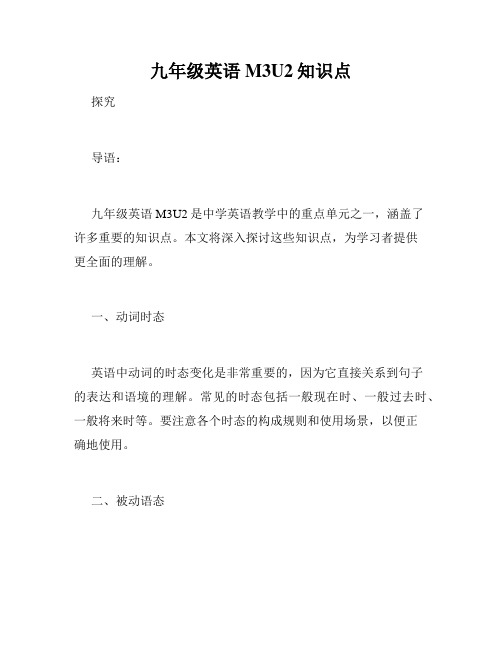
九年级英语M3U2知识点探究导语:九年级英语M3U2是中学英语教学中的重点单元之一,涵盖了许多重要的知识点。
本文将深入探讨这些知识点,为学习者提供更全面的理解。
一、动词时态英语中动词的时态变化是非常重要的,因为它直接关系到句子的表达和语境的理解。
常见的时态包括一般现在时、一般过去时、一般将来时等。
要注意各个时态的构成规则和使用场景,以便正确地使用。
二、被动语态被动语态也是九年级英语M3U2中的重要知识点。
在被动语态中,主语是动作的接受者,而不是执行者。
学生需要了解被动语态时态的变化和结构的构成,以及使用被动语态的情况。
三、情态动词情态动词是英语语法中的一个重要部分。
常见的情态动词包括can, could, may, might, must等。
情态动词用来表示某种能力、可能性、必要性等情况。
学生应该熟悉情态动词的不同用法和含义,以便正确地运用。
四、名词性从句名词性从句在英语语法中占有重要地位,它可以在句子中充当主语、宾语、表语等成分。
学生需要掌握名词性从句的引导词和结构,以及不同类型的名词性从句的功能和用法。
五、定语从句定语从句用于对一个名词进行修饰和限定,它可以提供更多的信息来描述名词。
学生需要理解定语从句的引导词和结构,以及定语从句和主句之间的关系,从而正确地使用定语从句。
六、状语从句状语从句用来表示条件、时间、原因、目的、方式等各种状况。
它可以在句子中充当状语成分,起到修饰句子的作用。
学生需要了解状语从句的引导词和结构,以及不同类型的状语从句的用法和功能。
七、虚拟语气虚拟语气用来表达与事实相反的假设、建议、愿望等情况。
虚拟语气通常使用动词的过去式或情态动词来构成。
学生应该了解虚拟语气的各种形式和用法,在需要的时候正确地运用。
八、宾语从句宾语从句是九年级英语M3U2中的一个重要知识点。
它用于充当主句的宾语,用来表示名词性成分。
学生需要熟悉宾语从句的引导词和结构,在需要的时候能够正确地使用宾语从句。
人教版M3U1 Fetivals around the world 语法 Grammar 情态动词

2).门就是打不开 ! The door won’t open.
8.Giving advice (提出意见):
How delicious!!!
You_s_h_ou_l_d_n_o_t/_o_ug_h_t_n_o_t_t_o__ eat so much before running.
can/could: 4. can never/can’t……too表示 “无论怎样…也不过分”,“越…越 好” 。
你过Ywoh马uil路eca的cnr时’ots候bsie再ngt小ot心ohe也car不roe为afdu过.l 。
can/be able to区别:
Edison always wondered why hens could hatch (孵) chickens
4. Permission (允许)
二.We also use modal verbs to:
5. request(提出请求) 6. suggestions(提出建议) 7. Make offers(提供帮助) 8. Give advice(提出意见)
1.Ability (能力):
Liu Xiang_c_an__run the 110m hurdle race within 13 seconds.
If you must leave, do it quietly.
—They___ be doing the
experiment in the lab.—Why?迹象
—Because the lights are still
burning.
A. could C. must
B. can D. would
• The two of us _m_u_s_t__ be one • Mother of my son • No one else w__il_l ___ do • I just want to be with you
外研版英语M3U1

问题解决策略与方法建议
创新教材内容与教学方式
结合学生的实际情况和教学需求,引入新颖的教学内容,采用 多样化、互动式的教学方法,提高学生的英语学习兴趣。
加强英语语言技能训练
通过大量的口语、阅读、写作等训练,加强学生的英语语言技能 ,提高他们的英语应用能力。
增加文化背景知识传授
在教学过程中增加英语国家文化背景知识的传授,帮助学生更好 地了解和掌握英语语言。
支持教师进行教学研究,探索新的教学方法和策略,提 高教学效果和教学质量。
家校合作与沟通渠道
家校沟通
建立家校沟通机制,定期组织家长会和家长座谈会,加强学校与 家长之间的联系和沟通。
家长教育
提供家长教育资源,帮助家长更好地了解孩子的学习情况,同时 也能提高家长的教育能力和水平。
亲子活动
组织亲子活动,加强家庭与学校之间的联系和互动,促进孩子的全 面发展和成长。
学生在课堂上的学习状态和合作能力。
02
作业完成情况
根据学生提交的作业质量、完成度和及时性进行评价,以了解学生对
课堂知识的掌握程度和自主学习能力。
03
期末考试
通过笔试、口试等方式评价学生对课程知识的掌握程度和运用能力,
以综合评估学生的学习效果。
教师自我反思与改进
反思教学目标与效果
根据学生的反馈和评价结果,反思教学目标是否合理、教学策略是否得当, 思考如何改进教学效果。
总结教学经验与不足
总结教学过程中遇到的问题和困难,分析原因,思考如何改进教学方法和策 略,提高教学质量。
04
教学资源与支持
教学辅助资源与工具
教学软件
提供与课程配套的教学软件,包括电子课本、教学视频、互动 练习等,方便学生进行自主学习和自我检测。
外研版英语M3U1

总结课文中常用的表达方式,如“It is our responsibility to do something about it”表示“我们有责任采取行动”。
05
文化背景知识
英国文化概述
要点一
英国文化的起源和发 展
英国文化深受历史和地理因素的影响 ,形成了独具特色的文化传统。
要点二
英国文化的特点
04
课文学习
课文背景介绍
介绍课文主题和背景
课文是关于环保和保护野生动物的讨论,涉及全球气候变化和物种多样性等 话题。
课文相关的文化背景
介绍一些国际环保组织和保护野生动物的计划,以及全球范围内环境保护的 重要性。
课文讲解与翻译
讲解课文中的生词和短语
对课文中的生词、短语进行解释和翻译,方便学生理解。
女王诞辰日
每年6月的第二个星期六是女王诞 辰日,是英国的法定节假日之一。
英国社会习俗
茶文化
英国的茶文化历史悠久,喝茶 是英国人日常生活的重要组成
部分。
礼仪习惯
英国人注重礼仪,有许多社交 习惯和礼仪规范需要遵循,例 如见面时握手、穿着正式等。
饮食习惯
英国人的饮食习惯也很有特点 ,比如喜欢喝茶、吃三明治和
教学大纲
教学目标
明确本单元的教学目标,包括知识、技能和情感等方面的目标。
教学内容
详细介绍了本单元的教学内容,包括重点和难点,以及各部分内容之间的联 系和作用。
02
词汇学习
词汇表
按字母顺序排列
将词汇按照字母顺序进行排列 ,方便查找和记忆。
词性分类
将词汇按照词性进行分类,如名 词、动词、形容词等,便于掌握 各类词性的用法。
配有中文释义
(2021年整理)牛津高中英语M3U1单词讲解

牛津高中英语M3U1单词讲解编辑整理:尊敬的读者朋友们:这里是精品文档编辑中心,本文档内容是由我和我的同事精心编辑整理后发布的,发布之前我们对文中内容进行仔细校对,但是难免会有疏漏的地方,但是任然希望(牛津高中英语M3U1单词讲解)的内容能够给您的工作和学习带来便利。
同时也真诚的希望收到您的建议和反馈,这将是我们进步的源泉,前进的动力。
本文可编辑可修改,如果觉得对您有帮助请收藏以便随时查阅,最后祝您生活愉快业绩进步,以下为牛津高中英语M3U1单词讲解的全部内容。
Unit1 (M3)1.hearing(n。
)听力,听觉the sense of hearing/sight/taste/smell/ touch2.raised(adj.)凸起的3.dot(n。
)点,小圆点4.sign(n.)符号,标志;迹象(v。
)签字sign languageroad signs路标no sign of lifeHe signed his name on the cheque.sign up for sth5.confuse(vt.)使糊涂,使迷惑;混淆confusing(adj。
)confused(adj。
)confusion(n.)困惑;混淆confuse A and/with B=mix upA with B6.vase(n。
)花瓶7.fog(n.)雾foggy(adj.)有雾的,雾茫茫的8.mist(n。
)薄雾;水汽9.fore cast(vt。
)/(n。
)预报,预测forecast-forecast-forecas tforesee v。
the weather forecast10.conduct or(n.)(公交车)售票员;(乐队)指挥conduct(v)。
实施,执行;指挥;引导conduct a survey/an experiment11.fare(n。
)车费taxi fares12.observe(vt。
- 1、下载文档前请自行甄别文档内容的完整性,平台不提供额外的编辑、内容补充、找答案等附加服务。
- 2、"仅部分预览"的文档,不可在线预览部分如存在完整性等问题,可反馈申请退款(可完整预览的文档不适用该条件!)。
- 3、如文档侵犯您的权益,请联系客服反馈,我们会尽快为您处理(人工客服工作时间:9:00-18:30)。
ought to ought not to should shouldn’t have to don’t have to
应该 不应该 应该 不应该 不得不 没必要
must: needn’t 没必要 必须 don’t have to do mustn’t 千万不要,禁止
Step 3.选择最佳选项:
should 12. For the Japanese festival Obon, people ________ (应该) go to clean graves and light incense in memory of their ancestors. can 13. It is now a children’s festival, when they _______ (能够) dress up and go to their neighbors’ homes to ask for sweets. 14. If the neighbors do not give any sweets, the children might ___________ (也许) play a trick on them. can 15. Festivals __________ (能够) also be held to honor famous people. can 16. Harvest and Thanksgiving festivals __________ (能够) be very happy events. will 17. In European countries, people ___________ (会,表意愿) usually decorate churches and town halls.
may might;
can could;
可以,可能 可能(更加不肯定)
能力,许可,可能性 (过去式语气委婉)
(表示)意志,意愿 will would; 过去的意志,意愿。提出请求比 will 客气,指现在。 shall (疑问句中一,三人称)征询,请求 should 应该
Step 2: 朗诵并记忆下列句子:
18. By now his restaurant ought to be full of people.
19. He had better do some research.
20. Perhaps he would be able to earn his living after all and not have to close his restaurant.
情态动词表示说话人对某一动作 或状态的态度,和动词原形构成 谓语。即 情态动词+do
Hale Waihona Puke 用所给的情态动词填空: may / might; can /could;
will / would;
shall / should;
would 8. Most ancient festivals ___________ (过去常常) celebrate the end of cold weather, planting in spring and harvest in autumn. would 9. Sometimes celebrations __________ (过去常常) be held after hunters has caught animals. would 10. At that time people ___________ (过去常常) starve if food was difficult to find. 11. Some festivals are held to honor the dead or to might satisfy the ancestors, who ___________ ( 或许) return either to help or to do harm.
用所给情态动词填空: ought to / ought not to; should / shouldn’t; have to / don’t have to; mustn’t; needn’t ought to 21.By now his restaurant __________ _______ (应该) be full of people. 22.—How can I grow thinner, Mum? have to —Well, you __________ (不得不) eat food with plenty should of fibre that helps you digest better. And you ____ (应该) stop drinking cola or eating sweet food. shouldn’t 不应该) eat my favourite —Does it mean I _________( fried chicken any more? needn’t —Not exactly, if you love fried chicken, you _______ (不必) give it up. Just eat it less often. needn’t / don’t have to (不必) worry too much. You ___________________
B C B D A/A C B A/A D
M3U1&2
Revision of grammar: Modal verbs
Step1:朗诵并记忆下列句子:
1. Most ancient festivals would celebrate the end of cold weather, planting in spring and harvest in autumn. 2. Some festivals are held to honor the dead or to satisfy the ancestors, who might return either to help or to do harm. 3. For the Japanese festival Obon, people should go to clean graves and light incense in memory of their ancestors. 4. It is now a children’s festival, when they can dress up and go to their neighbors’ homes to ask for sweets. 5. In European countries, people will usually decorate churches and town halls, and will get together to have meals. 6. At the Spring Festival in China, people may give children lucky money in red paper. 7. She could be with her friends right now laughing at him.
ought to 23. Perhaps we _________ _______ (应该) combine our ideas. 24. —You are sick because you’ve eaten poisonous mushrooms. Where did you get them? —I picked them in the forest. I know we ________ have to (不得不) eat fresh vegetables. mustn’t (不许,禁止) eat them —Oh, but you _________ until you’re sure they are not poisonous. —Thank you, doctor. I’ll be more careful next time. 25. — I wish I could see things clearly in the dark. to 应当) help you see better. —Eating carrots ought ___ ____( should 应该) eat some every day. You _______(
